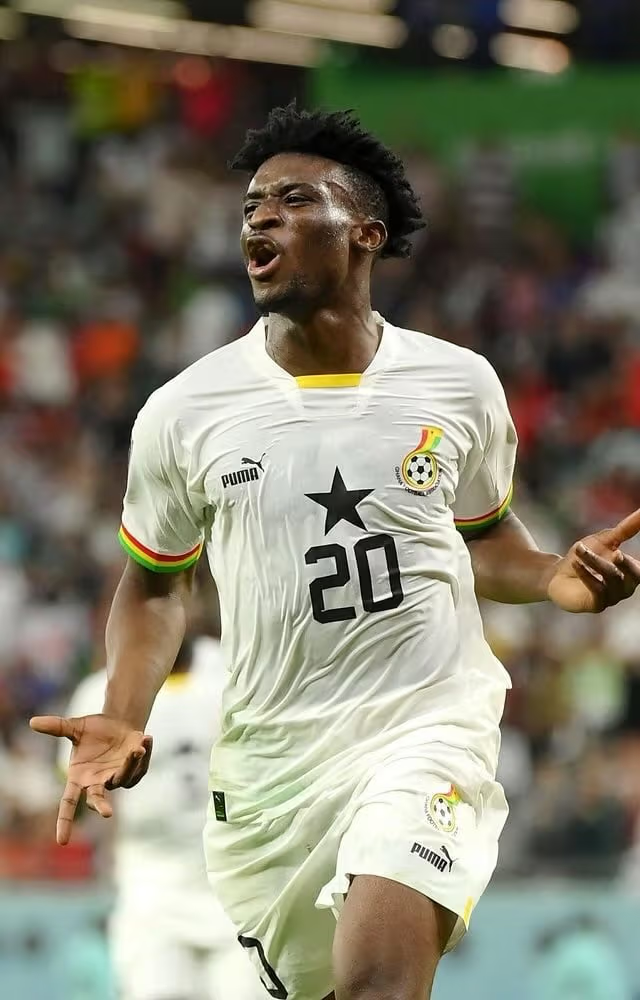Mohammed Kudus has always played with fire in his boots, and ahead of Ghana’s decisive 2026 World Cup qualifiers, he has spoken with the same fire in his voice. For the Tottenham Hotspur midfielder, Ghana’s place at the World Cup is not something to be debated or doubted. It is, in his words, “non-negotiable.” That phrase has resonated with fans, echoing the urgency and determination of a team and a nation that has been starved of global football glory in recent years.
The Black Stars are on the brink of securing their spot in the expanded World Cup to be staged in the United States, Mexico, and Canada. With 19 points already collected in Group I, Ghana needs just four more from their final two games to book a ticket to the tournament. The first challenge comes on October 8 in Morocco against the Central African Republic, followed by a home fixture on October 12 against Comoros at the Accra Sports Stadium. For Kudus, these games are not just about football; they are about pride, history, and the collective soul of a nation.
Reflecting on the disappointment of missing out on the 2025 Africa Cup of Nations, Kudus admitted that the setback was painful, but it has only sharpened the hunger for redemption. For him and his teammates, the World Cup presents the ultimate stage to show that Ghana is still a force in global football. “Qualifying is non-negotiable,” he declared in an interview with Sports Illustrated. “We have to qualify at all costs. I think we are on the right path now.” His words have been widely shared, a rallying cry not just to his teammates but to millions of Ghanaians who live and breathe the game.
For Kudus, representing Ghana goes far deeper than the pitch. It is about carrying the hopes of a country that celebrates its footballers as heroes, about giving back to the communities that nurtured his dreams, and about moments that unite a nation regardless of politics or hardship. “You represent your country like a one-time thing. That’s the one with the biggest emotion and feeling for me,” he explained. Every game in the national jersey, he said, is an opportunity to create memories that will be passed down, stories that parents will tell their children, moments that connect one generation to the next.
It is impossible to talk about Ghana at the World Cup without recalling 2010, when the Black Stars came within a whisker of becoming the first African team to reach the semifinals. The heartbreak in South Africa still lingers, but so too does the pride of a team that dared to dream big. Kudus has often spoken about drawing inspiration from that generation and believes this current squad has the quality to go even further. The task ahead is immense, but he insists that the belief and the determination are there.
Ghana’s campaign so far has not been without challenges. Injuries, tactical debates, and questions about consistency have dogged the team. Yet under Otto Addo, who has named a 24-man squad for the upcoming fixtures, there is a sense of quiet confidence. Addo himself knows what is at stake: the chance to restore Ghana’s place among the football elite and to give fans reason to believe again.
For many Ghanaians, these matches are more than qualification games. They are moments that carry the weight of national identity. In towns and villages, in Accra’s bustling streets and Kumasi’s crowded lorry parks, radios will buzz and televisions will flicker as people pause their daily routines to watch or listen. Street vendors will lean over radios, children will dribble makeshift footballs in alleyways, and older generations will recall past World Cup glories. Victory would bring relief and joy; defeat would bring heartbreak and frustration. Kudus understands this, and it is why he speaks with such urgency.
Football in Ghana is never just about sport. It touches politics, economics, and culture. A place in the World Cup translates into pride on the world stage, but also into commercial opportunities, jobs for local businesses, and moments of national unity. It can soften the edges of economic hardship, even if briefly, and offer something to cheer about when daily life feels heavy. Kudus, perhaps more than most, carries that weight with him. He is not just a player in England’s Premier League; he is a boy from Nima who grew up with the roar of the streets and the belief that football could change his life. That story connects him to every young Ghanaian who still believes the same.
As Ghana heads into these decisive fixtures, Kudus’ declaration will hang in the air: “Qualifying is non-negotiable.” It is a challenge to his teammates, a promise to the fans, and a reminder of what is at stake. If Ghana succeeds, the joy will be felt in every corner of the country, and Kudus’ words will be remembered as part of the journey. If they stumble, it will not be for lack of belief or determination. For now, the dream of 2026 remains alive, burning bright in the heart of one of Ghana’s most talented footballers, who has vowed to do everything to ensure that the Black Stars shine once again on the world’s biggest stage.

